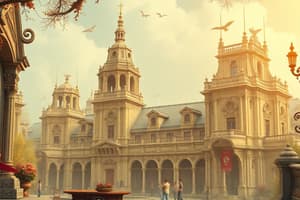Podcast
Questions and Answers
ಎಲ್ಲಿ ಛಂದನ ಇತಿಹಾಸ ಪಾಠನದಲ್ಲಿ ಮುಖ್ಯವಾಗಿ ಹೇಳುವ ಘಟನೆ?
ಎಲ್ಲಿ ಛಂದನ ಇತಿಹಾಸ ಪಾಠನದಲ್ಲಿ ಮುಖ್ಯವಾಗಿ ಹೇಳುವ ಘಟನೆ?
- ಕೊಲೆ
- ಸ್ವಾತಂತ್ರ್ಯ ಪ್ರೇರೇ ದ
- ಸ್ವಾತಂತ್ರ್ಯ ಹೋರಾಟ (correct)
- ವ್ಯಾಪಾರ ಮಾರ್ಗಗಳು
ಸಮಾಜ ಉತ್ಥಾನ ಮುಂತಾ ವ್
ಸಮಾಜ ಉತ್ಥಾನ ಮುಂತಾ ವ್
- 🙏
- 👴
- 🕊 (correct)
- 😡
‘Microeconomics’, ‘Macroeconomics’, ‘International Economics’ ಮ�...
‘Microeconomics’, ‘Macroeconomics’, ‘International Economics’ ಮ�...
- 😊 (correct)
- ❌
- 🌊
- 🔥
'Rural-urban migration', 'gender inequality', 'caste system' - Economics issues-లో ఏమి ముఖ్యం?
'Rural-urban migration', 'gender inequality', 'caste system' - Economics issues-లో ఏమి ముఖ్యం?
'Mahatma Gandhi', 'Subhas Chandra Bose', 'Indira Gandhi' -
'Mahatma Gandhi', 'Subhas Chandra Bose', 'Indira Gandhi' -
Flashcards are hidden until you start studying
Study Notes
Second PUC Arts Answers: A Comprehensive Review of Essential Subjects
In your pursuit of a deeper understanding of humanities subjects like Political Science, History, Sociology, and Economics, let's delve into some key insights from the Secondary Public Examination Council (PUC) Arts curriculum in India. These topics offer valuable perspectives that help us navigate our world with more informed decisions, critical thinking skills, and awareness of contemporary challenges.
Politics and Governance: Understanding Modern Indian Democracy through Political Science
Political Science introduces you to concepts such as political theory, comparative politics, international relations, public administration, and development. It equips students with analytical tools to scrutinize government actions, evaluate policy changes, and comprehend the complexity inherent in global governance structures.
Several relevant themes discussed within this subject encompass constitutional principles, federalism, election systems, political parties, civil society organizations, and the role of mass media during elections. Students also engage with current debates surrounding national integration, regional disparities, and interstate conflicts while analyzing historical trends in Indian democracy and its evolution over time.
Journey Through Time: Exploring Historical Contexts via History
History provides a fascinating narrative of humankind's past events — wars, trade routes, colonization, cultural exchanges, social movements, and much more. In the context of Second PUC Arts, students study modern Indian history from various angles; these include pre-colonial periods, colonial rule, freedom struggle, post-independence era, and contemporary developments.
Students learn how different regions have evolved; they analyze socio-economic factors influencing change, explore diverse cultures and their resilience amidst transformation, and understand complex dynamics underlying nation building. Key figures such as Mahatma Gandhi, Subhas Chandra Bose, Jawaharlal Nehru, Indira Gandhi, and numerous others feature prominently throughout this course.
Social Order: Concepts & Challenges in Sociology
The sociological perspective encourages students to examine societal norms and behaviors, individual roles within groups, and patterns of interaction between individuals and collectivities. Various theories and methodologies equip them to critique traditional values, appraise the impact of changing social conditions, and develop strategies to improve quality of life.
A few pertinent issues covered under this discipline involve population growth, rural urban migration, gender inequality, caste system, religious practices, and communal tensions. Students actively participate in group discussions, analysis of case studies, and application of empirical data to address existing problems.
Economic Growth and Development: Perspectives from Economics
Economics is a dynamic field that explores issues related to resource allocation, production, consumption, economic stability, and sustainable development. By studying microeconomics, macroeconomics, international economics, and environmental economics, students gain expertise essential for understanding contemporary economic phenomena.
Diverse aspects within this domain comprise foreign direct investment, poverty, income distribution, regional imbalances, unemployment, inflation, trade deficit, fiscal policies, monetary policies, and globalization's consequences.
I trust this overview has equipped you with a better grasp of each subject area, allowing you to engage confidently and critically with the wider scope offered by Second PUC Arts curricula. After all, education is a lifelong journey—a quest for knowledge that never ends!
Studying That Suits You
Use AI to generate personalized quizzes and flashcards to suit your learning preferences.




